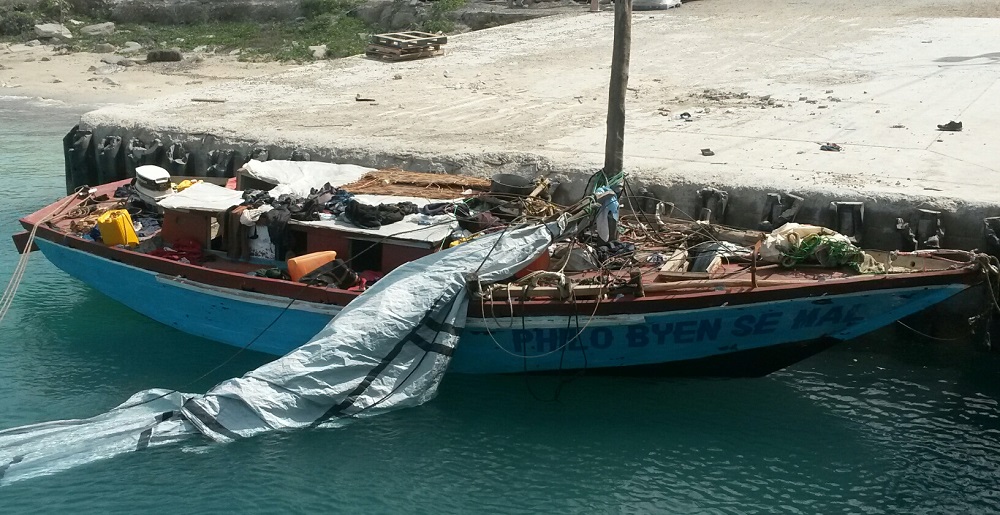News
Illegal Migration to TCI-The Risk of Open Borders
Published
2 years agoon

#TurksandCaicos, August 2, 2023 – The Turks and Caicos Islands is at a breaking point with the influx of illegal immigration. There are rising public demands for more vigorous border enforcement and rightfully so.
Over the past 7 years and beyond, thousands of illegal immigrants desperately and deliberately violated our nation’s laws by unlawfully embarking on our shores in TCI.
Countless number of illegal sloops have been intercepted, with some falling under the radar and making landfall. Albeit, like a number of other developed countries, we are not alone in this fight.
It seriously calls into question whether the British government is putting forward their best efforts to help protect our borders.
our borders.
With border protection falling squarely under the purview of our appointed Governors, it’s pretty evident they haven’t done everything within their powers and using every available resource at their disposal.
Many welcome the fact this new Governor has placed illegal immigration concerns front and center, and as one of her top priorities to address.
With TCI having such porous borders and limited resources, this makes it much more challenging to control.
The recent meeting held by our politicians with the British MP responsible for our territory, was a positive step in the right direction. Nevertheless, are we prepared to hold their feet to the fire and demand follow through and accountability?
The question many concerned citizens are still grappling with is, whether or not the politicians are ramping up enough pressure on the UK, which will force them to push the boundaries.
In my opinion, we are losing the battle in part, due to the failure and lack of cohesiveness of both political parties to come to terms on an immigration policy that works for all concerned.
Let’s be very clear, this is not a PDM, PNP or PDA issue. It’s a Turks and Caicos Islands issue. As we can see from successive governments, the battle is still raging on.
It’s fair to say, all parties wants what’s best for the country. So, how do we get commonly held ideas and beliefs on immigration to align without politicizing it? If anyone thinks it can be solved independently, it’s naive realism.
With the Dominican Republic having a housing deficit and Haiti becoming more and more unstable, we are facing a true emergency situation here and our national security could be in jeopardy.
It’s hard to imagine anymore illegal or undocumented migrants embarking on our shores. With that in mind, there is absolutely no time to waste.
The TCI way of life and the future of our natural environment and resources are also at risk.
It will largely depend on our ability to restore the proper balance between our own needs and the unlimited demands of poachers on our fishing banks and those that are on the move to our shores.
The relentless stream of Haitian vessels, depict the gritty realities of human suffering and the deep complexity of our own immigration policies.
I’m afraid, other countries facing similar political and economic instability, will use Haiti as a gateway to get to TCI, as we have seen with the Sri Lankan refugees.
As a British dependent overseas territory, can they do more to assist us? I applaud the former Governor, Nigel Dakin and the administration for their efforts with taking on the initiative to put in place a local regiment. This initiative provided that additional layer of external protection which the country could certainly benefit from.
Nevertheless, I question whether or not we have been able to effectively mobilized this unit from a strategic standpoint in the best interest of the country?
In times like these, how can we capitalize on the training and strength of the TCI regiment to help better protect our borders?
Although this is not exactly what this unit was designed for, as they continue to build those capabilities, I see it as a way forward in terms of responding to what is in fact a shifting and very dynamic landscape threat, be it on land or at sea.
Why not call into action the TCI regiment, and set up a self-sufficient camp on the beaches or in the marsh areas with revolving overnight shifts?
This will put them in a better position and readiness to round up migrants who are able to evade the radar system, making landfall and trying to escape authorities.
Utilizing cost effective methods like drone surveillance should also be deployed if we haven’t done so already. In an island cluster like TCI, implementing the proper intervention would have a direct impact.
island cluster like TCI, implementing the proper intervention would have a direct impact.
If we take the time to analyze the frequency and trend of when and where these illegal sloops are making landfall, for the most part the islands and geographical location remains relatively unchanged.
Ideally, in addition to the joint operation task force recently formed between the Bahamian and TCI government, it would make sense for the UK to deploy a decommissioned British navy vessel in the region more frequently and for a longer period of time.
This will provide the much needed assistance and more extensive capabilities for faster interception of these sloops before they even enter our waters.
It’s time we stop playing defense and ramp up our offense strategy. As we are well aware, detection of these vessels is only the first step in the overall prevention strategy.
Once these sloops enters our waters or make landfall, consequently, it opens the doors to all sorts of illegal operations, trafficking and security fears. The frequency of repatriation in itself, is also draining on our country’s limited financial resources.
Make no mistake about it, we welcome immigrants, because we know many are only seeking a better way of life or fleeing violence. I also agree, more can and should be done both regionally and internationally to assist migrants in their home country which will help to reduce the need of them risking their lives.
Nevertheless, our country is governed by a rule of law and there is a process in place that needs to be adhered too.
Based on the trajectory and the booming construction economy, I’m inclined to believe migration to TCI will not cease anytime soon.
It’s imperative that the powers to be have more engaging and compelling conversations along with the appropriate action around this issue.
The failure to control our borders, will continue to drastically change the conditions of labor supply and demand. In turn, it can have profound consequences especially on a small developing nation like TCI.
Ed Forbes
You may like
News
Beaches Turks and Caicos Showcases and Supports Local Creativity
Published
3 months agoon
September 12, 2025
September 12, 2025
PROVIDENCIALES, Turks & Caicos Islands – The Turks and Caicos Islands are home to a wealth of creativity, from artisans and craft vendors to musicians and performers. Beaches Turks and Caicos, the Caribbean’s leading all-inclusive family resort, has pledged its continued support for these individuals by providing meaningful platforms for them to share their skills and stories with guests from around the world.
The resort’s commitment is most evident in its weekly Cultural Night showcase, where visitors are immersed in the vibrant traditions of the islands. Guests enjoy live performances which feature local music genres such as ripsaw, while artisans display and sell handmade creations. This event not only enriches the guest experience but also strengthens economic opportunities for local entrepreneurs.
Entertainment Division Manager Garett Bailey emphasized the significance of Cultural Night, “we want to showcase everything the Turks and Caicos Islands culture has to offer. Our goal is for guests to leave with a deeper appreciation of the island’s art, music and traditions, while giving local talent the opportunity to share their creativity with visitors from across the globe.”
Beyond Cultural Night, Beaches Turks and Caicos also welcomes local craft vendors onto the resort every Wednesday and Friday where they are offered a direct space to market their goods. Guests have easy access to the Turks and Caicos Cultural Marketplace, where they can purchase authentic local arts and crafts.
where they are offered a direct space to market their goods. Guests have easy access to the Turks and Caicos Cultural Marketplace, where they can purchase authentic local arts and crafts.
Managing Director, James McAnally, highlighted how these initiatives reflect the resort’s broader mission, “we are committed to celebrating and sharing the vibrant culture of these islands with our guests. By showcasing local artistry and music, we not only provide entertainment but also help sustain and grow the creative industries of the Turks and Caicos Islands. From our cultural showcases to nightly live music, we are proud to create authentic connections between our guests and the people of these islands.”
Local musician Keon Hall, who frequently performs at the resort, expressed gratitude for the ongoing partnership, “being able to share my music with Beaches’ guests has created lasting relationships. Some visitors return year after year and request songs from previous performances. This partnership continues to celebrate what we do and strengthens the bond between local artists and the resort.”
The resort’s support of local artisans and entertainers extends beyond business opportunity; it is about preserving heritage and sharing stories. Guests take home more than souvenirs; they leave with experiences that deepen their understanding of Turks and Caicos’ culture and history.
Public Relations Manager, Orville Morgan, noted the importance of this commitment, “for many visitors, these interactions represent their first genuine connection to the Turks and Caicos Islands. From artisans and musicians to farmers and transport operators, our local talent helps shape every guest experience. At Beaches, we are proud to give them the stage to share their stories and their heritage.”
Beaches Turks & Caicos remains dedicated to developing cultural connections and supporting the artisans, musicians and entrepreneurs whose creativity makes the Turks and Caicos Islands unique. Each guest experience is an opportunity to celebrate and sustain the spirit of the islands.
Caribbean News
“Barbecue” is Cooked! US Turns Over 11 Million Haitians into Potential Informants with $5 Million Bounty
Published
4 months agoon
August 12, 2025
August 12, 2025
The United States just set fire to the underworld in Haiti — and this time, the smoke might finally flush out the man many call the most feared in the Caribbean.
On Tuesday, the U.S. government slapped a $5 million bounty on the head of Jimmy “Barbecue” Chérizier, the ex-police officer turned gang boss accused of orchestrating massacres, torching neighborhoods, and strangling Haiti’s capital into chaos. This isn’t just a headline — it’s a full-blown game-changer.
turned gang boss accused of orchestrating massacres, torching neighborhoods, and strangling Haiti’s capital into chaos. This isn’t just a headline — it’s a full-blown game-changer.
That kind of cash — offered under the State Department’s Transnational Organized Crime Rewards Program — is enough to turn the country’s entire population, more than 11 million people, into potential informants overnight. Add the millions in the Haitian diaspora, and Chérizier isn’t just wanted. He’s surrounded.
The Number That Changes Everything
Five million U.S. dollars today equals about 655 million Haitian Gourdes. In a country where many scrape by on less than $5 a day, that’s not just life-changing — it’s life-defining. It’s enough to rebuild homes, put generations through school, or buy a one-way ticket far from the gunfire.
In a place where trust is scarce and survival is everything, that figure is more than tempting — it’s irresistible. For Chérizier, it means every friend could be a future informant, and every loyalist might be calculating the cost of staying loyal.
‘We Will Find Them’ — Jeanine Pirro, U.S. Attorney
Jeanine “Judge Jeanine” Pirro, the U.S. Attorney, set the tone with fire in her voice. “This indictment is the first of its kind,” she announced. “Jimmy Chérizier, also known as ‘Barbecue,’ is a notorious gang leader from Haiti who has orchestrated and committed various acts of violence against Haitians, including the 2018 La Saline attack in which approximately 71 people were killed. He both planned and participated in that massacre.
“Anyone who is giving money to ‘Barbecue’ cannot say, ‘I didn’t know.’ They will be prosecuted, and we will find them. They are supporting an individual who is committing human rights abuses, and we will not look the other way.”
Pirro wasn’t just going after Chérizier. She was sending a warning to the Haitian diaspora accused of feeding his war chest from abroad: the days of claiming ignorance are over.
‘No Safe Haven’ — Darren Cox, FBI
Then came Darren Cox, Deputy Assistant Director of the FBI, delivering the muscle of America’s most powerful investigative force. “There is no safe haven for Chérizier and his network,” Cox declared. “We are closing every link, every cell.” Since January, he said, the FBI has arrested three Top Ten fugitives, taken more than 19,000 criminals off the streets, and seized thousands of tons of narcotics — enough to save millions of lives across the U.S.
The FBI’s Miami and Houston offices have already bagged one of Chérizier’s Viv Ansanm associates inside the United States without firing a shot. “These efforts are a deliberate and coordinated plan,” Cox said, “to protect our communities and confront escalating threats from terrorist organizations like Viv Ansanm.”
‘Three-Year Investigation’ — Ivan Arvelo, HSI
Ivan Arvelo, Assistant Director of Homeland Security Investigations, brought the receipts. “This is the result of a three-year investigation into Chérizier’s procurement networks, cash pipelines, and operational financing that violates sanctions,” he explained. Arvelo described 400 structures destroyed, entire communities erased, and a gang exploiting U.S. dollars, technology, and immigration loopholes to keep its killing machine running. “We tracked how Americans unwittingly bankrolled brutality,” he said — proof that the net is tightening both inside Haiti and abroad.
‘The Worst of the Worst’ — Chris Lambert, State Department
Chris Lambert, representing the State Department’s International Affairs division, gave the political bottom line.
“Mass violence in Haiti must end,” Lambert said. “The instability resulting from Chérizier’s actions fuels illegal migration, regional instability, and transnational crime. We will continue to apply every tool available — including our rewards programs — to stop the spread of unchecked violence, especially to target the worst of the worst criminal leaders threatening the people of our hemisphere.”
instability, and transnational crime. We will continue to apply every tool available — including our rewards programs — to stop the spread of unchecked violence, especially to target the worst of the worst criminal leaders threatening the people of our hemisphere.”
Lambert confirmed what many have long known: Chérizier is not just a gang leader. He commands Viv Ansanm, officially designated in May as a Foreign Terrorist Organization. In the eyes of the U.S., that makes him not just Haiti’s problem — but everyone’s.
Why Haitians May Not Resist
In Haiti, money talks — loudly. And when you put 655 million Gourdes on the table, it shouts.
That’s the kind of figure that turns casual acquaintances into informants and makes even the most hardened loyalist wonder if the payout is worth more than the risk. It’s not a matter of “if” word gets out, it’s a matter of “who will be first to collect.”
For grieving families, it’s a chance at justice. For the desperate, it’s a chance at survival. For Haiti as a whole, it’s hope — wrapped in the most dangerous of temptations.
An Answer to Prayers
For years, Haiti’s headlines have been a scroll of horrors — kidnappings, executions, burned neighborhoods, bodies in the streets. Chérizier’s name has been attached to too many of them.
This move by the U.S. isn’t just strategy. It’s personal. It’s a signal to every Haitian — at home or abroad — that the days of impunity could be ending.
I’ll admit it: when I heard the news, I danced, I sang, and I nearly cried. Not because $5 million is a lot of money, but because of what it means — the possibility, at last, of stopping the man accused of helping turn Haiti into hell on earth.
Four officials, four angles, one mission: Pirro’s fire, Cox’s grit, Arvelo’s precision, Lambert’s conviction. Together, they’ve put the heat on “Barbecue” like never before.
BBQ is cooked. The only question now is: which one of over 11 million potential informants will serve him up?
Africa
What If Caribbean Dollars Flowed to Africa? A Trade Revolution Within Reach
Published
4 months agoon
August 8, 2025
By Deandrea Hamilton | Editor
What would happen if the Caribbean started spending more with Africa?
That question is no longer hypothetical. It’s the vision behind a growing movement that sees the Caribbean not just as a neighbor of the Americas, but as a key partner in the rise of a “Global Africa.” With shared history, deep cultural ties, and emerging trade frameworks, experts say the potential is enormous—if the will to act finally matches the passion of the speeches.
Billions on the Table
Today, trade between Africa and the Caribbean sits at just over US $729 million annually. But the International Trade Centre (ITC) and Afreximbank project that number could balloon to US $1.8 billion per year by 2028—more than doubling in just a few years.
This boost is expected to come not just from commodities, but increasingly from services, particularly in transport, travel, food exports, and creative industries. Two-thirds of that growth, according to analysts, could come from services alone—sectors where the Caribbean is eager to expand. (afreximbank.com).
Meanwhile, Africa’s consumer and business spending is forecasted to skyrocket to US $6.66 trillion by 2030, driven by a population boom and rising middle class.
The Case for a New Trade Axis
The Caribbean imports 80% of its food, but many of those goods can be sourced from African markets. What we offer in return? World-class logistics, tourism know-how, financial services, and proximity to the U.S. market. It’s a natural fit—one that is currently underdeveloped.
The recent call by Grenadian Prime Minister Dickon Mitchell for a “Global Africa Commission” underscores this urgency. He urged stakeholders at the Afreximbank Trade Expo to stop the cycle of empty talk and get to work: building shipping routes, finalizing trade agreements, and boosting knowledge of what each region actually has to offer.
urged stakeholders at the Afreximbank Trade Expo to stop the cycle of empty talk and get to work: building shipping routes, finalizing trade agreements, and boosting knowledge of what each region actually has to offer.
“We will not leave here with another communiqué,” Mitchell continued. “We will leave here with a commitment to act, to build together, to trade together, to succeed together and rise together.” The statement underscored a central theme of the summit — that both Africa and the Caribbean can no longer afford to admire the idea of unity; they must operationalize it.Pilot platforms like the Pan-African Payment and Settlement System (PAPSS) are already simplifying how cross-border payments work between African countries—and could extend to Caribbean partners. The system removes the need for U.S. dollars in trade between African nations, creating space for sovereign empowerment.
What’s the Hold-Up?
Let’s be blunt: political will, slow bureaucracies, and lack of coordination are stalling real action. Despite a decade of “Africa–Caribbean unity” talk, less than 3% of CARICOM trade currently involves the African continent. That fact continues to undermine these brave speeches and ambitious notions.
Where Caribbean Consumers Fit In
Caribbean consumers—especially the younger, tech-savvy generation—are already looking for affordable, ethical, and culturally relevant goods. African markets offer exactly that. Redirecting even a fraction of spending toward African-made clothing, beauty products, tech tools, or agro-processed foods could start a real trade revolution.
Bottom Line
If the political leaders won’t build the bridge fast enough, maybe Caribbean consumers will. The money is there. The interest is rising. Now it’s time to turn the “Global Africa” vision into a real economic shift—one shopping cart at a time.









